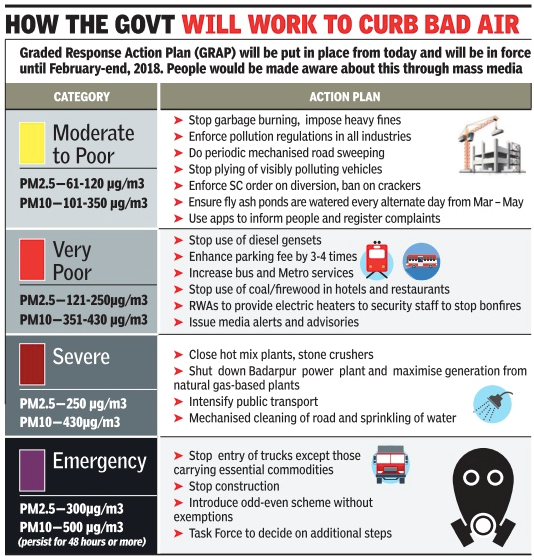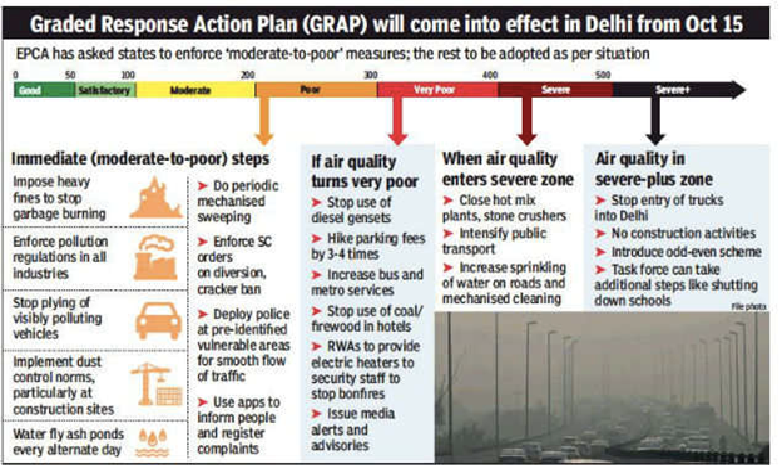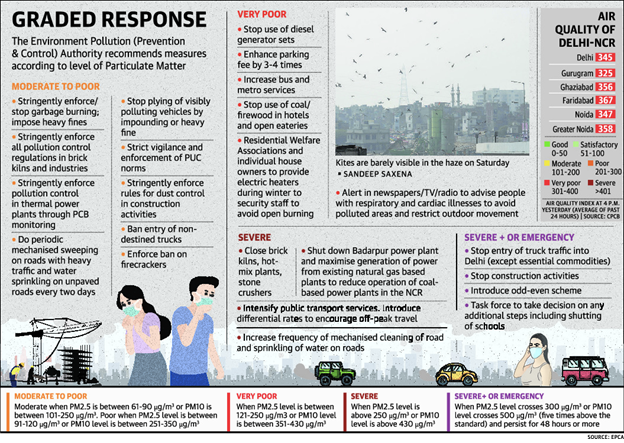GRAP and Pollution in Delhi NCR
Graded Response Action Plan (GRAP): In the Delhi NCR Region, GRAP functions as an immediate response to the air pollution problem.
Why GRAP Sub-Committee invoked the GRAP State IV?
- The GRAP Stage-IV actions were activated on 3.11.2022, based on the AQI forecasts, as the Delhi AQI approached the “Severe Plus” Category (AQI >450).
- The sub-Committee resolved to invoke Stage IV of the GRAP and schedule a review of the situation for November 6, 2022 because the projections likewise showed a considerable improvement around November 5–6.
- The average air quality index for Delhi on November 6, 2022, was 339 (in the “Very Poor” category), supporting the IMD/IITM prediction of an improvement.
- Since Delhi’s current AQI level is at 340, it is around 110 AQI points below the level required to activate GRAP Stage-IV actions (Delhi AQI > 450).
- The forecast by IMD/ IITM also do not indicate any steep degradation further.
- The GRAP Stage-IV is a disruptive stage with limitations that affects a lot of stakeholders and the general public.
- There are no more stringent actions that could be implemented to enhance the air quality scenario than those specified in GRAP Stage-IV.
CAQM Advisory to Citizens on Controlling Pollution in Delhi NCR
Commission has once again appealed to the citizens of NCR to cooperate in implementing GRAP and follow the steps mentioned in the Citizen Charter under GRAP. Citizens are advised to:
- Choose a cleaner commute – share a ride to work or use public transport or walk or cycle.
- People, whose positions allow working from home, may work from home.
- Do not use coal and wood for heating purpose.
- Individual house owners may provide electric heaters (during winters) to security staff to avoid open burning.
- Carry out multiple tasks in a single trip. Walk to errands wherever possible.
What is Graded Response Action Plan (GRAP)?
In 2016, the Supreme Court approved it and the plan was prepared by the Environment Pollution (Prevention and Control) Authority (EPCA). The institutionalised measures will be taken when the air quality deteriorates.
How GRAP will work?
GRAP functions as an emergency measure. The proposal leaves out state government action that will be performed all year to address industrial, vehicular, and combustion pollution.
Since the plan is progressive, the actions mentioned in both sections must be taken as soon as the air quality changes from “Poor” to “Very Poor.”
When air quality reaches a severe+ stage, the GRAP includes drastic measures including closing schools and adopting a system of allocating odd-even road space.
What are the measures that will be taken under GRAP?
1. Severe+ or in an Emergency
(PM 2.5 over 300 µg/cubic metre or PM10 over 500 µg/cu. m. for 48+ hours)
– Truck entry into Delhi would be halted aside from for necessities. Additionally, construction will come to an end.
– Odd/even method will be introduced for private automobiles, and exemptions will be kept to a minimum.
– A task force will be established to deliberate on any extra actions, such as closing schools.
2. Severe
(PM 2.5 over 250 µg/cu. m. or PM10 over 430 µg/cu. m.)
– Stone crushers, hot mix facilities, and brick kilns will all be shut down.
– Maximizing the use of natural gas in the production of electricity to decrease the use of coal.
– Public transportation will be encouraged with specific differential charges.
– More frequent road cleaning using machinery and water misting.
3. Very Poor
(PM2.5 121-250 µg/cu. m. or PM10 351-430 µg/cu. m.)
– The use of diesel generating sets will be suspended.
– The cost of parking will increase three to four times.
– The number of buses and Metro stops will grow.
– to prevent the lighting of wintertime fires by the provision of electric heaters by apartment owners.
– People with respiratory and heart disorders will receive warnings to limit outdoor activity.
4. Moderate to poor
(PM2.5 61-120 µg/cu. m. or PM10 101-350 µg/cu. m.)
– For garbage, heavy fines.
– In brick kilns and industries, Close/enforce pollution control regulations will be there.
– Mechanised sweeping on roads with heavy traffic and water sprinkling.
– To enforce a ban on firecrackers strictly.






